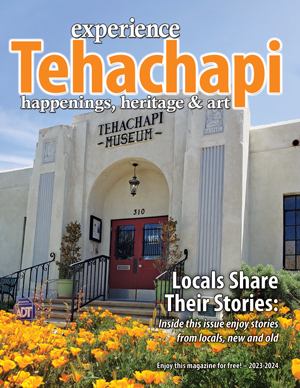Knights of the Road
The Spirit of Tehachapi
When I was just a little preschooler, in the early 1930s, we lived in Mojave. In those days of the Great Depression, men who were out of work sometimes “rode the rails” looking for work or maybe just enjoying being “knights of the road.” At any rate, I have read the code that the hobos made up and passed along to one another signifying which house was good for a handout and which ones to avoid. I have seen these printed out occasionally in magazines and, of course, online. I never knew if our house in Mojave had a mark on it but nearly every day a man would appear at our back door asking if he could chop stove wood for food. Now, as I think back, it seems strange that my mother could allow a man with a pack on his back, not too clean, to wield an axe while she and a small child were alone in their home. No telephone was installed in those days for most residents. We were the last house in town and our only neighbor was the local cemetery. Chopping wood, they did, and feed them, she did. She, being a southern girl, made biscuits each morning. We had chickens and the meal for the men was more than likely biscuits, eggs and sometimes bacon. Often the meal was just leftovers from a previous night’s dinner. There was never any problem, and the hobo ate it all. This was often an everyday occurrence.
My father had secured employment for the State Highway Department of Road Maintenance.
It was a good job but one that kept you outside, and he became deeply tanned. One day he came home from work talking about a dog that had shown up at work. He was a mixed breed and looked like a German Shepherd but was a reddish color. He told Mom to put extra biscuits in his lunch so the dog could have some. “Red,” as he called the dog, loved biscuits. Finally, one day he told Mom, “I’m going to bring that dog home tomorrow. He’s too good of a dog to be a stray.” So Red came home and our current dog, Brownie, objected. They finally worked it out, and we had two dogs.
One thing about Red though: he hated men with packs on their backs. He must have been mistreated by them at one time. After that, there were no more people knocking at the back door of our house. I remember in those hobo marks that there were “Bad Dog” signs, also.
The procedure of the Southern Pacific and Santa Fe Railroads was to let the itinerants ride over the Tehachapi mountains and then have the brakeman kick them off at Mojave. The brakemen didn’t give them much trouble but the railroad hired men called “bulls” did. Those Railroad Bulls were sometimes very mean. In our western states the bulls usually just put them off the train and did not arrest the “free riders.” In the southern states, however, they could end on a chain gang doing hard labor.
I guess there is a “pecking order” in many walks of life for there was definitely a class system among those who hopped freights. The real “knights of the road” deemed themselves travelers as a guest of the railroad lines. They were out to see America and considered themselves above the tramps, bums and fugitives of the law, but they all shared a common bond; that of staying clear of the bulls and the police.
Traveling in an open box car was a premium way to journey along but one had to be particularly careful to escape being trapped in one and at the mercy of the bulls. They must have, especially, liked to travel atop the freight cars for we, as children, traveling by car, would wave to them as we passed. They always waved back as did the engineers up in the engine. The engineers still wave, even today.
My father, having been both a brakeman and switchman, knew how to “hop a freight.” I guess there is a technique for most everything. Daddy said to always wear shoes with a heel and to use both hands when boarding a moving boxcar in case one hand would slip off the bar. Also, never put both hands on the same iron ladder rungs. He also said to “step wide” when walking on top of a box car to the next in case the cars suddenly adjust as at times they are want to do without warning.
Society has never given me an occasion to use this particular bit of knowledge passed down to me by my father, as to hopping a freight or walking atop a box car. Actually though, the lack of opportunity has never kept me awake nights.
There is a song that I first heard in elementary school: “The Big Rock Candy Mountains.” It sings the praises of the hoboes who traveled the open road by rail. It’s a carefree, cheerful ballad. I checked the lyrics online not long ago and realized that through the years I had mixed up verses and had been singing it wrong. Still though, the part I do remember, though somewhat jumbled, is the best part, to me:




